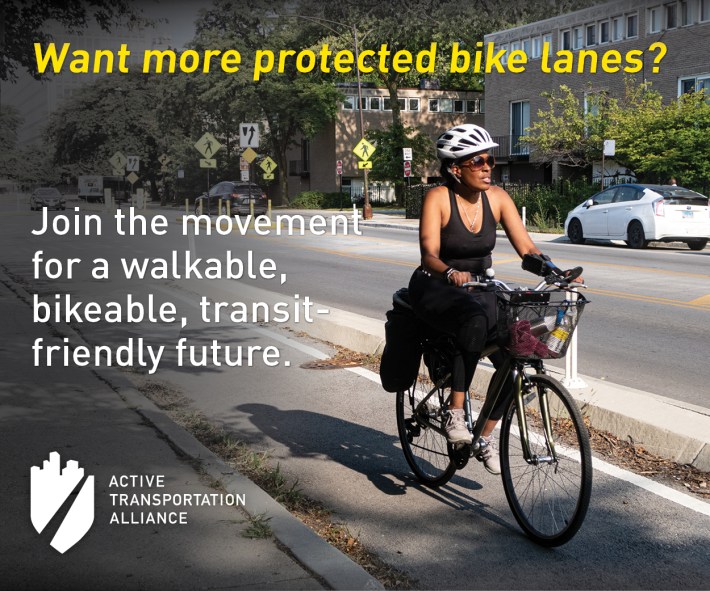
Whether the subject is traffic safety or transit funding you can almost always count on the right-leaning Illinois Policy Institute think tank to get the story wrong when it comes to livable streets issues.
Granted, they have recently surprised me with their support for additional dwelling units, aka "granny flats," which can help make it more affordable to live near public transportation. But that's an example of the old saying, "Even a broken clock is right twice a day." It was kind of like Donald Trump helping to bring about a ceasefire in the Middle East.
But I digress. Today I'd like to discuss and debunk Illinois Policy's recent article about Springfield's fall veto session negotiations to bridge the looming Chicagoland transit fiscal cliff. Titled "Lawmakers push DoorDash, Uber Eats delivery tax statewide for Chicago transit," it includes some dubious statements that I'll unpack.
"Lawmakers may approve a statewide delivery tax on Doordash and Uber Eats to fund Chicago transit, hitting all Illinoisans who shop online, even those who don’t use CTA, Metra or Pace," reads the subheading. That's basically factual, but it implies there's something unfair going on, which is not the case.
The originally proposed "climate impact fee" is from public transportation reform/funding bill HB 3438, which passed the State Senate but wasn't voted on by the House at the end of the spring legislative session last May. The proposal was for a $1.50 surcharge on retail and restaurant deliveries made by motor vehicle, but the charge wouldn't apply to pharmacy or grocery purchases.
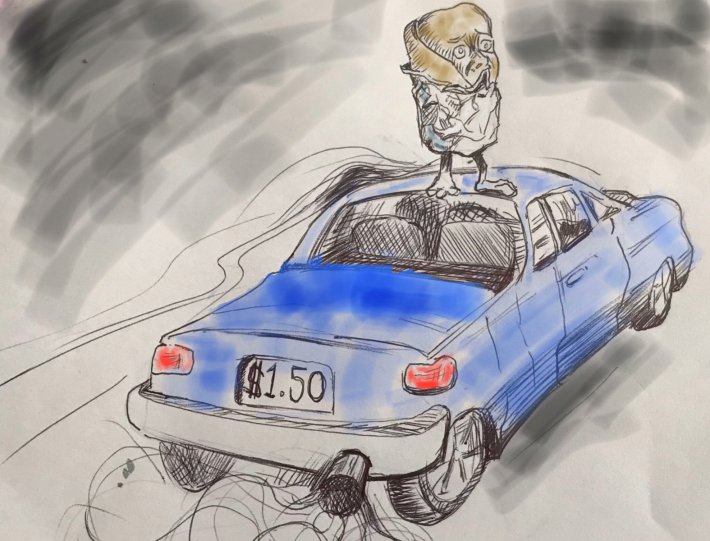
Detractors call it a "pizza tax." Here at Streetsblog we've nicknamed it the "Burrito Taxi Tax," since it applies to items that often don't really require car trips. Not only would it help fill the transit budget hole, but it would also help reduce the societal costs associated with crashes, congestion, and pollution.
As for the implication that the fee would negatively impact residents who don't use Chicagoland transit, here are a couple of reasons why that insinuation is off-base. First of all, in addition to the legislation, which includes other revenue sources as well, raising $1.5 billion annually for CTA, Metra, and Pace, it would provide $200 million for Downstate transit.
Moreover, buses and trains are the lifeblood of the Chicago area's economy, which in turn powers the rest of Illinois. A recent study by researchers at Argonne National Laboratory and MIT found that if the region faces a transit monetary precipice of $771 million next year, as originally projected, that would cost the entire Land of Lincoln $14 billion. So it's not like Downstaters don't already have skin in the game when it comes to preventing transit from falling off the cliff.
However Illinois Policy noted that in a report last week from WAND News, Democratic House Speaker Emanuel "Chris" Welch is quoted saying the Burrito Taxi Tax would be lower than previously proposed. "A $1.50 delivery charge is tone deaf to what we're hearing at the doors and in communities all across the state," he said. "I'm not saying that a delivery charge isn't going to be considered at some level, but certainly not at $1.50."
Illinois Policy notes, "The proposed delivery tax, along with other proposals, has drawn criticism from some Republicans." They include a statement by suburban Republican State Sen. Seth Lewis from a WTTW piece last June, after he and the rest of the Senate GOP voted against HB 3438.

"This has become a bailout for Chicago CTA," Lewis told WTTW. "We’re giving [Mayor Brandon Johnson] more control. We’re giving him more than a billion dollars in revenue."
I had a very civil conversation with Lewis last month. He represents western suburbs served by three Metra lines, and he went on a December transit research trip to Germany with other Chicagoland politicians and agency officials.
In that interview, he explained that he was opposed to the structure of the Northern Illinois Transit Authority, a more powerful replacement of the Regional Transportation Authority, proposed in HB 3438. He was concerned that a rule allowing a measure to pass with support from 15 out of 20 directors would let the 15 Chicago-, Cook County-, and State of Illinois-appointed NITA board members overrule the five suburban collar county reps. On the other hand, the same approach could be used to override the Chicago faction.
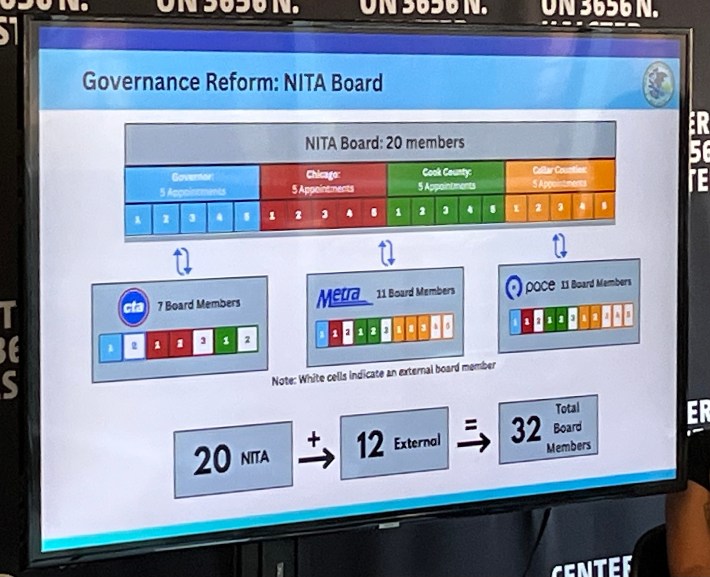
Lewis told me that, like all his Republican colleagues, he was opposed to new taxes and fees to fund transit, and preferred other financial strategies to address the fiduciary canyon. These included using roughly $300 million in interest from the state's rainy day fund.
Surprisingly, RTA recently lowered its projection for Chicagoland's transit budget gap to only $202 million in 2026. However, if a new transit source isn't established soon, the pecuniary chasm is expected to become even larger than $771 million the following years. Transit-friendly Democrats say it's crucial that lawmakers don't just kick the can down the road again.
During our September conversation, it didn't actually seem like Lewis still viewed transit funding legislation as simply a "bailout for Chicago." Rather, he appeared to understand that addressing the budget gap is also crucial for his suburban constituents. "[Transit is] very important," he told me. "Out of the 18 communities I represent, or partially represent, in the northwest suburbs of DuPage County, I want to say 15 of them have a Metra line running through them, or access very near."
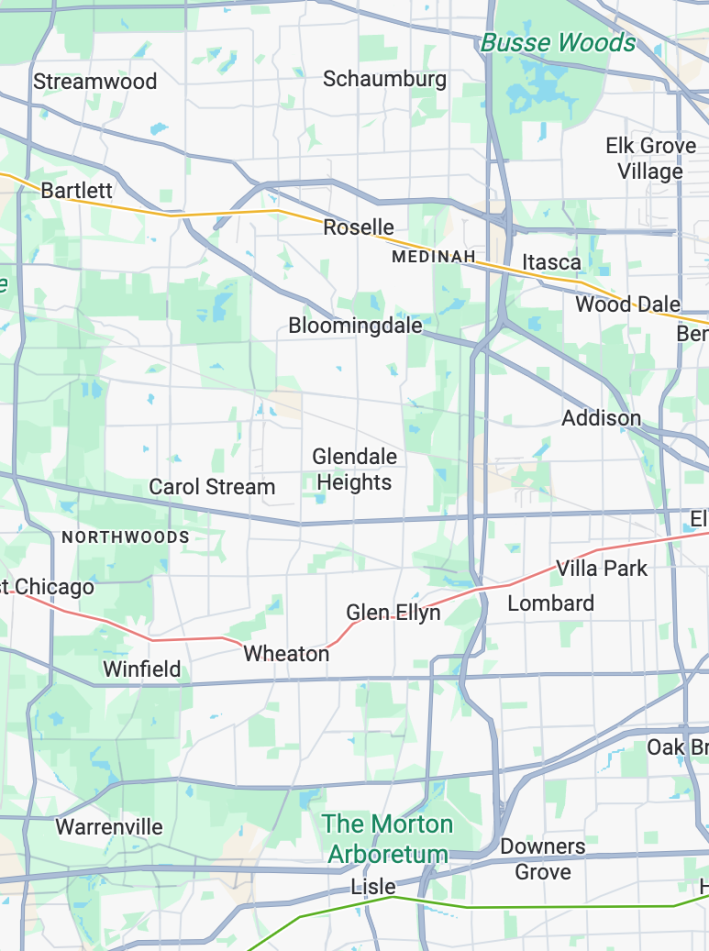
However, Illinois Policy reiterates, "A delivery tax wouldn’t just affect people in the Chicago region who rely on public transit." They add, "It would hit every Illinoisan who shops online, including those who may never use CTA, Metra or Pace services. Whether the final amount is $1, 50 cents or a quarter, it’s still a new statewide charge to prop up a Chicago-area transit system."
Again, while not all Prairie State residents use Chicagoland transit, each of us would benefit from a more robust northeast Illinois system. We'd all suffer economically if the previously projected 40 percent service cuts and 3,000 layoffs became a reality. And the additional $200 million for Downstate transit would be a major perk for Illinoisans from Carbondale to Rockford.
I'll end by mentioning an extremely whiny recent Twitter thread from Illinois Policy about the House Democrats' survey for voters on transit funding options. The fiscal hawks decry the possibility of new fees for using car deliveries, ride-hail, and tollways – all things with societal costs, also including wear-and-tear on roads – to fund transit.
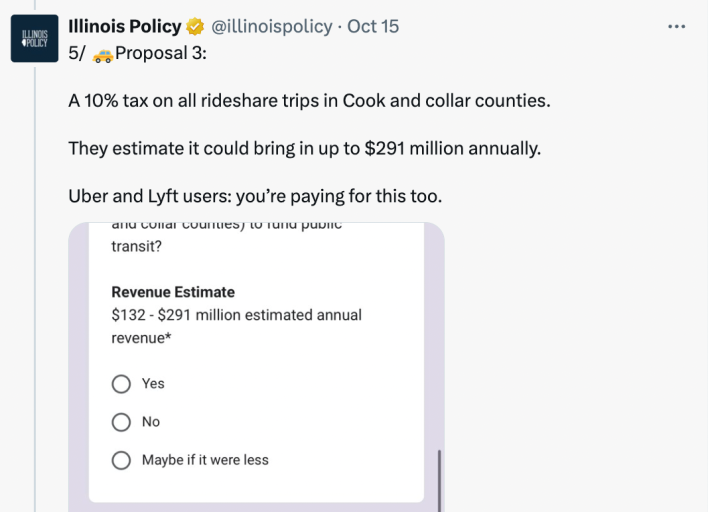
At the end of Illinois Policy's pity party, they exhort their followers, "Tell lawmakers: No new taxes. No transit bailout."

Illinois Policy's attitude towards transit funding reminds me of an Oscar Wilde quote: "A cynic is a man who knows the price of everything, and the value of nothing."
Read the Illinois Policy piece here.
Read the WAND News report here.

Do you appreciate Streetsblog Chicago's paywall-free sustainable transportation reporting and advocacy? We officially ended our 2024-25 fund drive in July, but we still need another $42.5K+ to keep the (bike) lights on in 2026. We'd appreciate any leads on potential major donors or grants. And if you haven't already this year, please consider making a tax-deductible donation to help us continue publishing next year. Thank you!




